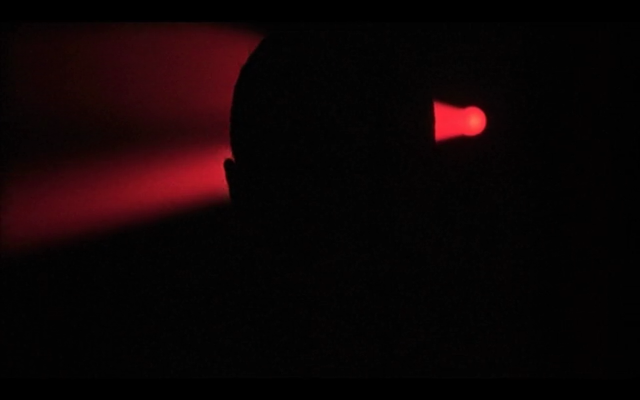lit by a pulsing light.
Morvern doesn't bother to turn the Christmas lights off. Their behavior sets a visual tone for the movie, which will cast Morvern in and out of darkness.
We learn about Morvern through light and by Morven's face. The visuals like thematic glue.
Light touching Morvern Callar's face, an echoing visual:
And intuitively one feels as Morvern does, that the Christmas lights are inescapable. The repetitive sensation links one's memories to the Christmas lights, and the dead boyfriend beside it, to the present; tethered to Morvern's sensations I can relate to her, lost in the search for a light bright and warm.
We're both bugs seeking light.
And too, a bit goose.
There's a lot of drinking and smoking in the movie. She's a Scottish supermarket cashier, counting down to pension, and the movie follows her through Christmas celebrations and a Spanish vacation.
The dialogue feels loose and naturalistic but is laser-precise, if infrequent. The writing is good movie writing because it doesn't make her story a writer's mission; it's Morvern's movie, and I never felt like a writerly voice was imposed on her (it takes no narrative 'shape'). One of the longest stretches of dialogue is between Morvern and two people from a publishing house who want to purchase the book:
Male Publisher: Is there anyone on the business side, re the book, that we should be talking to specifically? Someone back in the UK?
Female Publisher: Yeah, do you have an agent, or -- someone, you know, to deal with.
Morvern: Me -- t,talk to me.
MP: Directly, great.
FP: Great.
MP: Fine.
FP: That's great.
MP: Well, um so
FP: Fantastic.
MP: So we like it, no agent. Since we're talking to you, directly, what did you have in mind, dealwise?
Morvern: (silent)
MP: Well, should I just put something out there. We were thinking of...something in the region of...one-hundred.
FP: I know it's always a bit awkward talking about money --
MP: Well, more than that, I'll be direct, I mean -- we love the novel, that's why we're here, we don't just jump the plane to Spain at a day's notice on, um, every unsolicited manuscript that comes through the door. But. You are a first time writer, and as such we're taking a risk taking you on, and you have to appreciate that --
FP: I can assure you that for a first time writer a hundred thousand pounds is-is a really good deal.
Morvern: (beat) (picks up glass, sets glass down, half-smiles) Can I go to the toilet?
FP: Of course.
Morvern agrees to sell them the book, and the three celebrate by chatting and drinking until sunrise.
The solution to her financial problem. She asks her friend Lanna (Kathleen McDermott), whom she traveled with to Spain (the trip: a minor disaster), to vacation with her again.
Lanna: I'm happy here.
Morvern: Are yuh?
Lanna: Yeah. Everyone I know is here, there's nothing wrong with here Morvern, it's just the same crap as everywhere so stop dreaming.
This is the tragedy of the inescapable lights, of the burdens and ravages of time and memory, and one's hopeless flight from oneself.
The movie ends in a club scene. The Mama and The Papas song Dedicated to the One I Love plays; the title refers to her boyfriend's book being written for her, and the mixtape he left her, and brings us back to the beginning.
The movie ends as it begins, pulsing lights against the face of Morvern Callar. You can't escape the lights.
Lanna: I'm happy here.
Morvern: Are yuh?
Lanna: Yeah. Everyone I know is here, there's nothing wrong with here Morvern, it's just the same crap as everywhere so stop dreaming.
This is the tragedy of the inescapable lights, of the burdens and ravages of time and memory, and one's hopeless flight from oneself.
The movie ends in a club scene. The Mama and The Papas song Dedicated to the One I Love plays; the title refers to her boyfriend's book being written for her, and the mixtape he left her, and brings us back to the beginning.
The movie ends as it begins, pulsing lights against the face of Morvern Callar. You can't escape the lights.
























































